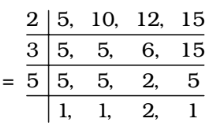LCM and HCF
- What least number must be subtracted from 1936 so that the resulting number when divided by 9, 10 and 15 will leave in each case the same remainder 7 ?
-
View Hint View Answer Discuss in Forum
LCM of 9, 10 and 15 = 90
⇒ The multiple of 90 are also divisible by 9, 10 or 15.
∴ 21 × 90 = 1890 will be divisible by them.
∴ Now, 1897 will be the number that will give remainder 7.
∴ Required number = 1936 – 1897Correct Option: C
LCM of 9, 10 and 15 = 90
⇒ The multiple of 90 are also divisible by 9, 10 or 15.
∴ 21 × 90 = 1890 will be divisible by them.
∴ Now, 1897 will be the number that will give remainder 7.
∴ Required number = 1936 – 1897 = 39
- The smallest number, which when divided by 5, 10, 12 and 15, leaves remainder 2 in each case; but when divided by 7 leaves no remainder, is
-
View Hint View Answer Discuss in Forum
LCM of 5, 10, 12, 15

∴ LCM = 2 × 3 × 5 × 2 = 60
∴ Number = 60k + 2
Now, the required number should be divisible by 7.
Now, 60k + 2 = 7 × 8k + 4k + 2
If we put k = 3 , (4k + 2) is equal to 14 which is exactly divisible by 7.Correct Option: B
LCM of 5, 10, 12, 15

∴ LCM = 2 × 3 × 5 × 2 = 60
∴ Number = 60k + 2
Now, the required number should be divisible by 7.
Now, 60k + 2 = 7 × 8k + 4k + 2
If we put k = 3 , (4k + 2) is equal to 14 which is exactly divisible by 7.
∴ Required number = 60 × 3 + 2 = 182
- The largest number of five digits which, when divided by 16, 24, 30, or 36 leaves the same remainder 10 in each case, is :
-
View Hint View Answer Discuss in Forum
The n digit largest number which when divided by p, q, r leaves remainder ‘a’ will be
Required number = [n – digit largest number – R] + a
where, R is the remainder obtained when n–digit largest number is divided by the L.C.M of p, q, r.
We will find the LCM of 16, 24, 30 and 36.
∴ LCM = 2 × 2 × 2 × 3 × 2 × 5 × 3 = 720
The largest number of five digits = 99999
On dividing 99999 by 720, the remainder = 639Correct Option: B
The n digit largest number which when divided by p, q, r leaves remainder ‘a’ will be
Required number = [n – digit largest number – R] + a
where, R is the remainder obtained when n–digit largest number is divided by the L.C.M of p, q, r.
We will find the LCM of 16, 24, 30 and 36.
∴ LCM = 2 × 2 × 2 × 3 × 2 × 5 × 3 = 720
The largest number of five digits = 99999
On dividing 99999 by 720, the remainder = 639
∴ The largest five-digit number divisible by 720
= 99999 – 639 = 99360
∴ Required number = 99360 + 10 = 99370
- The least multiple of 7, which leaves the remainder 4, when divided by any of 6, 9, 15 and 18, is
-
View Hint View Answer Discuss in Forum
LCM of 6, 9, 15 and 18

∴ LCM = 2 × 3 × 3 × 5 = 90
∴ Required number = 90k + 4, which must be a multiple of 7 for some value of k.
For k = 4,Correct Option: D
LCM of 6, 9, 15 and 18

∴ LCM = 2 × 3 × 3 × 5 = 90
∴ Required number = 90k + 4, which must be a multiple of 7 for some value of k.
For k = 4,
Required Number = 90 × 4 + 4 = 364, which is exactly divisible by 7.
- What is the least number which when divided by the numbers 3, 5, 6, 8, 10 and 12 leaves in each case a remainder 2 but when divided by 13 leaves no remainder ?
-
View Hint View Answer Discuss in Forum
We find LCM of 3, 5, 6, 8, 10 and 12 = 120
∴ Required number = 120q + 2, which is exactly divisible by 13.
Required number = 120q + 2 = 13 × 9q + 3q + 2
Clearly 3q + 2 should be divisible by 13.
For q = 8 , 3q + 2 is divisible by 13.Correct Option: B
We find LCM of 3, 5, 6, 8, 10 and 12 = 120
∴ Required number = 120q + 2, which is exactly divisible by 13.
Required number = 120q + 2 = 13 × 9q + 3q + 2
Clearly 3q + 2 should be divisible by 13.
For q = 8 , 3q + 2 is divisible by 13.
∴ Required number = 120q + 2 = 120 × 8 + 2
Required number = 960 + 2 = 962

